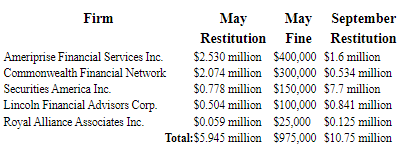
Sep 2013
"These investments are popular, but risky," Mr. Galvin said in a statement. "Our investigation showed widespread problems with adherence to the firms' own policies as well as the state rule that an investor's purchase of REITs cannot be more than 10% of that person's liquid net worth."Interestingly, the distribution of fines and restitution payments is very different between this settlement and the one in May. In particular, Securities America was leveled with a much higher restitution payment.
